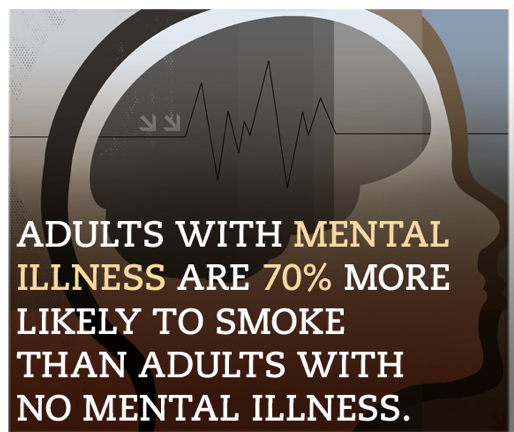Cigarette smoking has remained “alarmingly high” among individuals with mental illness, and the disparity of smoking rates between those with and without mental illness is growing, according to a new study published in Psychiatric Services.
Smoking is the leading preventable cause of death in the U.S. It has been well documented that people with mental illness smoke at greater rates than the overall population. Increased rates of smoking is a major factor contributing to people with serious mental illness dying much younger than people without mental illness.

While overall rates of smoking have been declining since the 1960s, researchers led by Faith Dickerson, Ph.D., M.P.H., at Sheppard Pratt Health System in Baltimore, wanted to look specifically at the trends among people with serious mental illness. They found significant declines in smoking over the 18-year study period among people without a psychiatric disorder, but not for people with schizophrenia or bipolar disorder.
The study found 62 percent of those with schizophrenia and 37 percent of those with bipolar disorder identified themselves as smokers. Only 17 percent of people without a psychiatric disorder identified as a smoker.
While there may be many contributing factors, one factor may be limited treatment available to help quit smoking in psychiatric facilities, the authors suggest. The authors also note that several misbeliefs about smoking seem to persist, for example, that people with mental illness need to smoke to cope with symptoms and that patients are not interested in quitting or cannot quit. Substantial previous research has shown that smoking cessation efforts can be effective for people with mental illness. New guidelines from the federal Centers for Medicare and Medicaid Services (CMS) provide incentives for hospitals to provide smoking cessation treatment to all patients.
The researchers did report the encouraging finding that people with mental illness are smoking fewer cigarettes. They also found that fewer people under 30 were smokers, compared to older adults, and they smoked less.
A recent effort by the Truth Initiative, a nonprofit focused on tobacco-control, calls out the tobacco industry for targeting people with mental illness. Among the facts highlighted by the group: 40 percent of cigarettes sold in the U.S. are smoked by people with mental health challenges. The Truth Initiative ran adds during the recent MTV Music Awards accusing tobacco companies of targeting people with mental illness. The Truth Initiative is working to raise awareness and inspire action to end smoking.
References
- Dickerson, F, et al. Cigarette Smoking by Patients with Serious Mental Illness, 1999–2016: An Increasing Disparity. Psychiatric Services online. Sept. 2017.
- Truth Initiative. 2017. Business or Exploitation? Cashing in? Big Tobacco is Taking Advantage of People with Mental Illness.
Repost from American Psychological Association.
